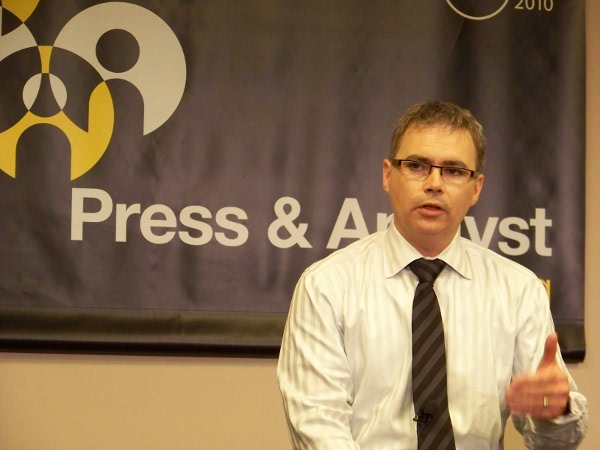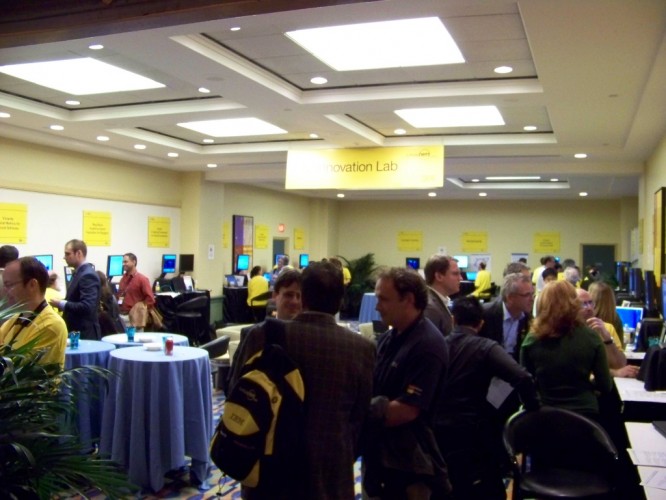
I really need to clone myself – there are way too many good sessions at Lotusphere 2010. And it doesn’t help that I’ve got an tight appointment schedule set up, ie. analyst meetings and briefings on everything from LotusLive, UCC to IBM Lotus Strategy.
But it’s fine with me, there’s a lot of takeaways, some of Day 1 Analyst Briefings follow:
Q&A with Dwight Morse, Lotus Notes Channel Marketing Lead
The announced Vulcan Project – some kind of next gen Lotus Notes in the cloud – started a long time ago in the IBM labs. It’s bringing together a lot of ideas (also from some recent acquisitions).
What do I think? I like the idea of an advanced knowledge worker’s workspace, integrating IM with social web tools, putting some effort into being more presence- and task-aware, the tagging of documents, the sharing of bookmarks in communities, the searching and connecting with people and communities. Add to this the open APIs …
The two things I am still doubtful with are this focus on documents as the main unit and object of interest. I sense an inclination to a document-centric approach. But we agree it’s content after all, and we should rethink our understanding of what we deal with?
The other thing is the Social Analytics stuff – while I find it interesting and able I know that it will raise a lot of concerns with people employees, probably slowing down acceptance. This grief may stem from my european-ness, but I can’t help it. Probably needs a staged approach, a lot of explaining and show-and-tell, and some smart tweaking options (is opt-in a valid option or does it only work when we’re allowed to sift through all data?).
OK, it’s a vision for the future, a roadmap – and they understand that information is the basic unit – be it mail, documents, or whatever.
Next thing we were speaking about was the Collaboration Agenda – it was explained to me as a solution selling naming, ie. helping the problems of explaining and selling a complex thing like Notes in an “elevator speech”. Elevators will see pitches like these:
Ya know, everyone needs to collaborate, and let me ask you directly: „What is your need? What are the pain points you see in your organization? What are the things you need to do and can’t do today?“
[…]
Let me introduce you to the solutions IBM and Lotus can offer you … (yes, I will cater for the jobs of tailoring and selecting from our portfolio …)”
Four industries are targeted, overall vertical markets where business partners shall provide solutions to discrete needs (CRM & sales, innovation management, etc.). Here Lotus Foundations will not be pushed as a product, but it’s a part of the tool box solutions get chosen from.
Q&A with Brendan Crotty, Program Director for LotusLive
LotusLive Labs is conceived as a way to expose new innovations coming from IBM Labs. Cool things included like some kind of “automatic video transcribing” so that a recorded presentation can be accessed at individual segments.
Most interesting is that IBM is expecting to learn a lot from the data and the feedback, ie. speeding up development of this “perpetual beta”. Did I say beta? Don’t be afraid, Labs is easy on the admin side, ie. it’s easy to decide who’s going to get access, a lot of business controls etc.
From a partner and customer perspective (think of Salesforce etc.) it was said that it’s going to be easy to integrate with LotusLive, because of adherence to open standards and data exchange models (RESTful et al. …). We’ll see if that’s pulling through, I must say that open standards are a hot meme among the IBM executives I’ve been talking to, next to the notion of “we will cater to what our customers need and want”. No, I am not going to write about the iPhone …
Q&A with John Del Pizzo – Sametime / UCC
Noted down: In the past they used IBM-specific standards, now it’s SIP (hmm, XMPP too I guess) – overall a bet on open standards, that allows for more connectivity (with competing providers too, yes). Thus Sametime can act as a client for Radvision, Tandberg, etc. as an endpoint.
John stressed that providing UCC at the desktop drives adoption, but needs simplicity. Well, simplicity, usability and ease of use drive adoption, then adoption drives ROI. Nothing to argue with that.
Interesting business cases again, like some customers wanting to use UCC for service (and customer collaboration) uses.
On the question of how this compares and competes with Microsoft Communication Server he argued along the lines of simplicity and usability (see up there …), scalability, openness, standards, interoperability, ability to integrate Sametime where it’s needed (hmmm, HTML5 or AJAX-ey integration?).
Q&A with Alistair Rennie, Lotus General Manager

Rennie summed up the announcements – then answered questions, covering cloud based collaboration, the Panasonic deal, mobile collaboration etc. Some notes:
– Social Analytics is getting customers excited, and they’ve got more (research based) ideas coming, eg. on how to finetune recommendations
– Customers want and need integration, Notes acts as a collaboration hub, administered from one point. Customers want and need openness
– to deal with the diversity of (european) markets it’s best to sort out the individual best practices (cause these are always geographically-tied best-practices …) – nothing to argue with that, but I would say that we have a growing portion of EU-designed regulations (compliance!), and basic patterns are similar
– emerging markets are going strong in collaboration software – and they are as (IT-) sophisticated as the rest of the world. They grab this new disruptive opportunity, ie. setup something mission-critical collaboration software without having to keep legacy systems working (why yes, fresh installs and leapfrogging can be good …). IBM is having more and more „research pockets“ and laboratories around the world – this helps with catering for the various markets (and I say with innovating in the areas that matter).
– we’ve also heard some bad-mouthing criticism on Microsoft – but OK, this is probably normal and we all know those IT guys know how to “play”. I leave it to you to select from the batch: “too tightly integrated stack”, “missing some substantial thoughts”, “missing out in mobile (they don’t get what people are asking for)”, “missing out in social software”, “what they are doing is not going to be more relevant for customers”. Don’t flame me …
– on collaboration – yes, appears and happens on all levels (and even between organizations). People now expect social collaboration capabilities to get their jobs done. Yes, I would add we need to focus on freeform emergent collaboration, like eg. all those barely repeatable processes (hat tip to Sig Rinde) which can’t hardly be predefined …
 Project Vulcan wird so sicher auch auf dem kommenden Lotus JamCamp diskutiert, das heute offiziell angekündigt wurde:
Project Vulcan wird so sicher auch auf dem kommenden Lotus JamCamp diskutiert, das heute offiziell angekündigt wurde:

